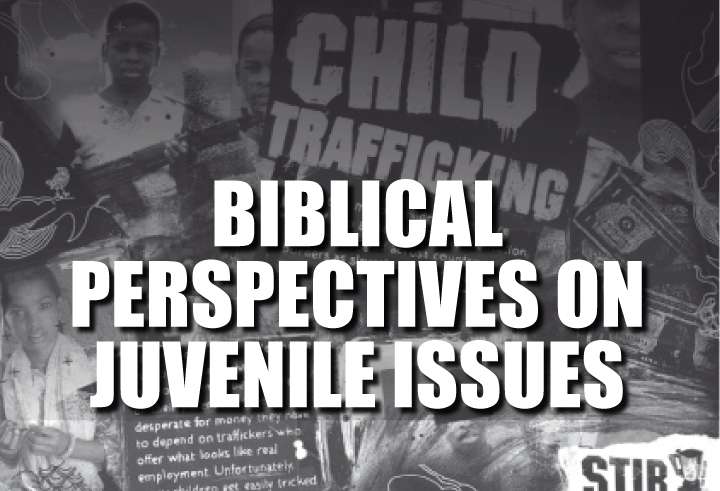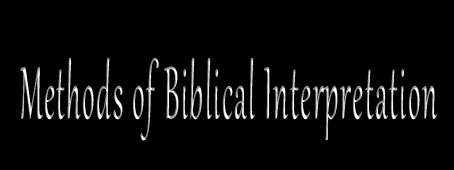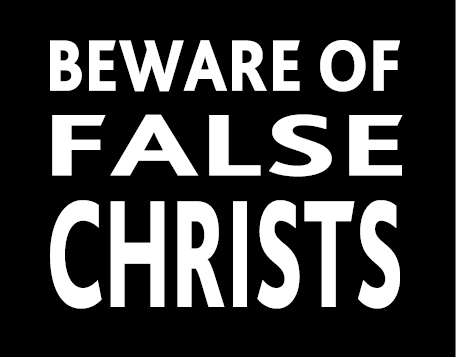

Biblical Perspectives on Juvenile Issues
Dr. Saju Joseph
While the terms ‘youth ministry’ or ‘children’s ministry’ are not specifically mentioned in Scripture, perhaps the most relevant verse to troubled youth was penned by Paul in I Corinthians 4:15, “Even though you have ten thousand guardians in Christ, you do not have many fathers, for in Christ Jesus I became your father through the gospel” (NIV). Just as it was clear that the Corinthians had a bigger need for a father than another teacher, so also do troubled kids today. This verse lays the groundwork for a basic paradigm of effective ministry to juvenile offenders.
In some ways kids today are not any different than they have ever been. They’ve always had the same basic needs. Yet in another way, because so many kids have not had their basic, God-given needs met, the profile of the average kid has changed dramatically over the past few years.
An old Chinese proverb says, "One generation plants the trees, and another gets the shade." You and I are still benefiting from the shade provided by trees planted by our parents, grandparents, and great-grandparents. We are shaded, to some degree, by their moral standards and spiritual commitment.
Proverbs 23: 24 says, "The father of the righteous will greatly rejoice, and he who sires a wise son will be glad in him." But how is it that in spite of God's design for children to bring joy, happiness, contentment, satisfaction, and love to their parents, they so often become heartbroken instead ? Marriages and families that ought to be filled with peace, joy, and contentment are more often characterized by conflict, intimidation, and estrangement. Homes tend to be war zones rather than havens. We are raising a generation of people exposed to an evil sun, unprotected by any kind of proper, God-ordained standard of living.
God calls all children to be obedient and respectful. Obedience is the act; honour is the attitude. Neither of them comes naturally, however. The Minnesota Crime Commission reports: "Every baby starts life as a little savage. He is completely selfish and self-centred. He wants what he wants when he wants it: his bottle, his mother's attention, his playmates’ toys, his uncle's watch, or whatever. Deny him these and he seethes with rage and aggressiveness which would be murderous were he not so helpless. He's dirty; he has no morals, no knowledge, no developed skills. This means that all children, not just certain children but all children, are born delinquent. If permitted to continue in their self-centered world of infancy, given free rein to their impulsive actions to satisfy each want, every child would grow up a criminal, a thief, a killer, a rapist."
Scripture teaches that children develop in four areas. Luke 2:54 tells us Jesus grew in wisdom (mentally), stature (physically), favour with God (spiritually), and favour with mankind (socially). When children enter this world, they are undeveloped in these areas. They have to be taught to obey simply because it is right to do so.
Genes play a major role in the development of both our bodies and our minds. The evolving field of behavioural genetics is gradually elucidating the complex interplay between genes and environment that contributes to the behavioural differences between individuals. One area of behavioural genetics that has attracted a great deal of attention is the exploration of the roots of violent behaviour. Researchers hope someday to have the ability to detect accurately persons at high risk of violence and to develop effective “anti-violence” interventions for use with this population.
Although such innovative technologies appear to be beyond our reach today, the societal implications of behavioral genetics research may require our consideration much sooner that might be thought. In fact, behavioral genetics may be the next frontier for the world of criminal justice. The scientific data that suggest that the inclination to evil may be embedded - at least in part- in our genes provide a new context for an old ethical and legal question regarding criminal responsibility and punishment: if the inclination to violent behavior is inherent in someone's nature, how should it affect punishment for crime? Should it be considered a mitigating factor that lessens the degree of punishment, or should it serve as an aggravating factor justifying a more severe sanction?
In this article we address this question from a Biblical perspective, relying primarily but not exclusively on the classical rabbinic commentators. We suggest that although the context of behavioural genetics is relatively new, the question pertaining to the relationship between the inclination to evil and the punishment of crime is not. The issue is addressed in the Old Testament and discussed by its commentators; their insights may enrich the contemporary discussion of this question.
One of the earliest systematized moral codes can be found in the Old Testament. The Hebrew Bible's moral philosophy cannot be reduced to a single moral theory as, for example, both deontological and utilitarian voices can be found in it. Similarly, since the Bible presents various justifications for punishment (such as deterrence, revenge, rehabilitation, etc.) in different cases, it would be inaccurate to ascribe to its authors a univocal theory of punishment. In fact, the multidimensional character of the Bible with regard to morality has preserved its capacity to serve as an inspirational source of reference for proponents of a range of moral views.
The context in which the Bible refers to the question of the propensity to evil and punishment is woven in the story about Noah. After the flood, the Bible suggests God's less-than-favourable opinion regarding human nature: “the imagination of man's heart is evil from his youth” (Genesis 8:21). The Bible ascribes to God the notion that humans are inherently evil from a very early stage of development. This Biblical notion was shared by some more recent scholars, albeit on varying theoretical grounds, such as Thomas Hobbes and Sigmund Freud. Hobbes developed a political theory based on the assumption that human nature is evil and hostile, while Freud's psychological theory–and its cultural ramifications–are rooted in the contention that infant behaviour derives, in part, from innate aggression.
How early can one find the manifestations of this wickedness in a child? According to early Christian and Jewish traditions (200-450 AD), badness is attributed to a man even in infancy. Saint Augustine believed that “there is none free from sin, not even the infant who has lived but a day upon this earth... the infant's innocence lies in the weakness of his body and not in the infant mind...I have myself observed a baby to be jealous, though it could not speak; it was livid as it watched another infant at the breast”. Jewish scholars at that time also shared the notion that badness is embedded in man since the time he “awakens” to the world.
New Testament Perspectives
Recently a growing number of Christians have actively promoted the concept of "restorative justice" and attempted to develop programs for dealing with crime based on restorative principles. But is this approach truly consistent with the teaching of Scripture? To date, very little has been done to test this claim. Beyond Retribution fills a gap by plumbing the New Testament on the topics of crime, justice, and punishment.
Christopher Marshall first explores the problems involved in applying ethical teachings from the New Testament to mainstream society. He then surveys the extent to which the New Testament addresses criminal justice issues, looking in particular at the concept of the justice of God in the teachings of Paul and Jesus. He also examines the topic of punishment, reviewing the debate in social thinking over the ethics and purpose of punishment -- including capital punishment -- and he advocates a new concept of "restorative punishment." The result of this engaging work is a biblically based challenge to imitate the way of Christ in dealing with both victims and offenders.
New Testament or Christian approach towards the juvenile issues would be two fold. One is envisaging the possibilities of quality parenting and mentoring of children. The church has to take deliberate effort in both training the children as well as parents. The parents should be given regular and periodical training in parenting for the different stages of growth of the child. Sunday Schools, V.B.S and children’s clubs must incorporate practical and realistic counseling programs for the children. The church must develop a strong monitoring system for the children so that they may be given timely attention and counseling. It would help the children, up to an extent, to develop positive attitudes and character in them and delinquent tendencies will be minimized also.
The child who exhibits a rebellious streak may be doing so for a variety of reasons. Harsh, unloving, and critical parenting will nearly always result in rebellion of some sort. Even the most compliant child will rebel - inwardly or outwardly - against such treatment. Naturally, this type of parenting is to be avoided.
But no matter what style of parenting a family embraces, a child might rebel.
Assuming that the rebellious child naturally possesses a strong-willed personality, he will be characterized by an inclination to test limits, an overriding desire for control, and a commitment to resisting all authority. In other words, rebellion is his middle name. In addition, these strong-willed, rebellious children are often very intelligent and can “figure out” situations with amazing speed, finding ways to take control of the circumstances and people around them. These kids can be, for their parents, an extremely trying and exhausting challenge.
Fortunately, it is also true that God has made children who and what they are. He loves them, and He has not left parents without resources to meet the challenge. There are biblical principles that address dealing with the rebellious, strong-willed child with grace. First, Proverbs 22:6 tells us to “train up a child in the way he should go: and when he is old, he will not turn from it.” For all children, the way they should go is toward God. Teaching children in God’s Word is crucial for all children, who must understand who God is and how to best serve Him. With the strong-willed child, understanding what motivates him-the desire for control-will go a long way to helping him find his “way.” The rebellious child is one who must understand that he is not in charge of the world-God is-and that he simply must do things God’s way. This requires parents to be absolutely convinced of this truth and to live accordingly. A parent who himself in rebellion against God will not be able to convince his or her child to be submissive.
Once it has been established that God is the one making the rules, parents must establish in the child’s mind that they are God’s instruments and will do anything and everything necessary to carry out God’s plan for their families. A rebellious child must be taught that God’s plan is for the parents to lead and the child to follow. There can be no weakness on this point. The strong-willed child can spot indecisiveness a mile away and will jump at the opportunity to fill the leadership vacuum and take control. The principle of submitting to authority is crucial for the strong-willed child. If submission is not learned in childhood, the future will be characterized by conflicts with all authority, including employers, police, law courts, and military leaders. Romans 13:1-5 is clear that the authorities over us are established by God, and we are to submit to them. May God help the church and the parents to teach the delinquent children this truth.






















